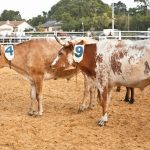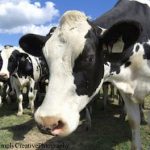United States Senator Jon Tester (D-Montana) has introduced a bill to suspend beef imports from Brazil after there have been repeated issues with delayed reporting of Bovine Spongiform Encephalopathy (BSE), or Mad Cow Disease, in beef products. The legislation would force a systemic review of the beef's safety before imports could resume. Tester said in a statement, "Montanans demand the highest level of safety and certainty in their beef, and Brazilian imports aren’t making the cut. Folks expect their beef to have been rigorously tested against the strictest of standards, and concerns about Brazilian imports not only jeopardize consumer trust, but present a serious risk to Montana producers. We owe it to our domestic producers and consumers to halt Brazilian imports until we can … [Read more...]
Cow with Atypical BSE Diagnosed in Alabama
The USDA announced on Tuesday, July 18, 201 that an eleven year old cow in Alabama has been diagnosed with an atypical case of Bovine Spongiform Encephalopathy (BSE), or mad cow disease. The press release states that "This animal never entered slaughter channels and at no time presented a risk to the food supply, or to human health in the United States." The animal was showing clinical signs of the disease and was round through routine surveillance at an Alabama livestock market. Atypical BSE is different from classic BSE and it usually occurs in cattle older than 8 years. It arises spontaneously and rarely in all cattle populations. The press release from the Alabama Department of Agriculture & Industries states that following delivery to the livestock market, the cow later … [Read more...]
FDA Announces Final Rule on Mad Cow Disease in Food
The FDA has finalized a rule designed to reduce the risk of bovine spongiform encephalopathy (BSE), sometimes called "mad cow disease" in human food. This rule covers definitions for prohibited cattle materials in food, dietary supplements, and cosmetics. The materials include specified risk materials (SRMs) of brain, skull, eyes, trigeminal ganglia, spinal corn, vertebral column, and dorsal root ganglia of cattle 30 months of age and older, and the tonsils and distal ileum of the small instating of all cattle. Also prohibited are the small intestine from all cattle unless the distal ileum has been properly removed, material from non ambulatory cattle, and material from cattle not inspected and passed, or mechanically separated beef. The rule confirms that milk and milk products, … [Read more...]
Mad Cow Emerges in Germany
At least one case of bovine spongiform encephalopathy (BSE), otherwise known as Mad Cow Disease, has been confirmed in Germany. That country has claimed for years that its country was free of BSE, but they were wrong. Public health officials claim that the cow was killed and none of it entered the food chain. Germany instituted "high standards" for animal feed, but traces of meat and bone meal were found in cattle feed recently. A 1994 European Union ban on feeding ruminants meat by-products was supposed to eliminate those ingredients. The cow was 10 years old, and tested positive for atypical BSE, which develops spontaneously in older cows. It had seven offspring. Five have already been slaughtered, and two others were on the same farm. They have been tested and killed. The herd is … [Read more...]
US Gets Nod For Mad Cow Risk Upgrade
The U.S. is set for a mad cow disease risk upgrade from the World Organization for Animal Health (OIE). The organization’s scientific commission notified the U.S. Department of Agriculture (USDA) this week that the United States' risk classification for bovine spongiform encephalopathy (BSE), also called Mad Cow Disease be upgraded one risk level, from “controlled” to “negligible.” The OIE determines BSE risk status based on the actions a country has taken to manage the risk of the disease. “These actions include instituting a strong ruminant-to-ruminant feed ban, strictly controlling imports of animals and animal products from countries at risk for the disease, and conducting appropriate surveillance,” according to the USDA. The U.S. submitted an application for upgrade to the OIE’s … [Read more...]
Japan Eases Cattle Restrictions on U.S. Imports
The Japanese government decided yesterday to ease restrictions it has placed on U.S. beef imports. Restrictions put in place in 2006 that partially opened the markets did not allow the import of beef from cattle older than 20 months; the industry standard is 30 months. The agreement, dated January 25, 2013, requires that the U.S. must "meet or exceed" World Organization for Animal Health (OIE) guidelines to be considered controlled risk for bovine spongiform encephalopathy (BSE). In addition, U.S. meat establishments should be certified as eligible to export meat to Japan, and the Japanese government may conduct on-site audits of the U.S. inspection system. In 2003, Japan banned U.S. beef completely after a case of mad cow disease was discovered in Washington state in 2003. Secretary … [Read more...]







